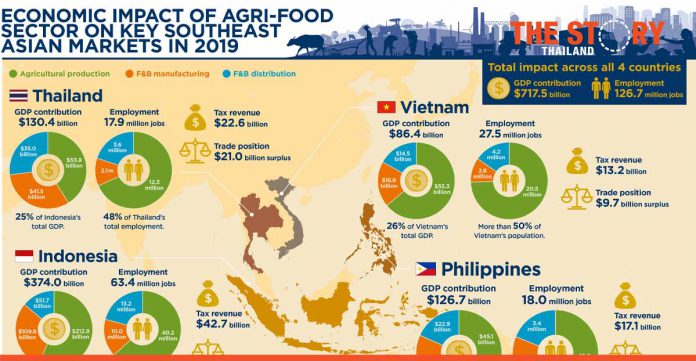Thailand’s agri-food sector contracted by 6%, or Bt228 billion, last year with a corresponding decline of 8%, or 730,000 people, in its workforce, largely due to the effects of the COVID-19 pandemic, revealed new research by Oxford Economics.
Food Industry Asia (FIA) commissioned The Economic Impact of the Agri-Food Sector in South East Asia to better understand the challenges faced by the region’s industry last year, with the report highlighting the pivotal role the sector will play in Thailand’s economic recovery, creating employment and putting affordable food on the table.
- AIS warns against increaasing online scams
- Visa becomes first major payments network to settle transactions in USD Coin (USDC)
Thailand’s agri-food sector faces the third most challenging recovery of the region’s 10 countries, after the Philippines and Indonesia, scoring just 4.9 out of 10 in the report’s Economy Recovery Matrix. Thailand’s food industry is especially vulnerable because of its dependence on tourism. Its inbound tourism market, the largest in Southeast Asia, has been devastated by the pandemic. Tourism accounted for 9.5% of Thailand’s total food consumption in 2019 and international arrivals are not expected to return to pre-pandemic levels before 2024.
Commenting on the findings, Visit Limlurcha, Chairman of Food Processing Industries Club, The Federation of Thai Industries said that this paints a worrying picture for the recovery of an industry that in 2019 accounted for one-quarter of the economy (Bt4 trillion), employed almost half of the workforce (17.9 million people), and contributed more than Bt708 billion in taxes. This reinforces how important it is for the government and the industry to work together to overcome the significant challenges the agri-food sector faces.
“The report shows just how vital the agri-food sector is to Thailand’s economy. While the sector’s contribution shrank because of the pandemic, it contracted by less than the economy as a whole. The industry is fully committed to working with the government to ensure we play a critical role in the post-pandemic recovery and that the agri-food sector remains a key driver of the economy,” Visit said.
According to Mr Matt Kovac, Executive Director of FIA, the government must recognise current and future risks that agri-food companies face, before developing policies and implementing measures to drive the post-pandemic recovery. Unintended policy consequences could easily scuttle the agri-food industry’s and Thailand’s economic recovery plans, potentially leading to rising business and consumer costs, and leading to closure of businesses and job losses.
Mr Kovac added, “Thailand’s agri-food sector will face strong headwinds next year, including a slump in food and beverage demand as well as longer-term challenges that will linger beyond the pandemic. Policymakers must consider such issues before introducing policies that could potentially hamper the agri-food sector’s recovery, given the scale of the industry’s contribution to Thailand’s economy and job market.”
The report notes that Thailand’s sales tax rates are low when compared with global standards, which increases the risk of a sales tax hike as a way to finance public spending needed to support a recovery. The potential for this puts the country most at risk in Asia from post-COVID-19 fiscal adjustments, according to the report’s Fiscal Risk Assessment Framework.
James Lambert, Director of Economic Consulting Asia for Oxford Economics, said, “Thailand’s agri-food sector faces significant risks from any fiscal adjustments, especially given its vulnerable state due to the effects of the pandemic. It is important for any fiscal policy implemented to be carefully planned, designed, and communicated, which we have seen through the government’s existing COVID-19 policies to support businesses, including those in the agri-food sector, and stimulate domestic spending.”
“Sound fiscal policies that support the agri-food industry will enable it to continue contributing strongly to Thailand’s economy as it has done so for decades. This will support people in Thailand, small businesses and a wider economy recovery given that households spend more than a third of their income on food and non-alcoholic beverages,” said Lambert.
The report recommends governments focus on three areas to help the agri-food sector overcome challenges caused by the pandemic and external pressures such as the closure of borders: using education to influence sustainable or health behaviours, favouring regulatory standards over taxes and maintaining a constant dialogue with the industry.
With rising incomes and growing populations driving consumer demand for higher quality food, the research also highlights key recommendations to meet this, including to improve land and labour productivity, which requires technological innovation and skills development, and a sound and supportive policy environment. This includes investing in new technologies to improve the resilience, efficiency, and environmental sustainability of the region’s labour-intensive food value chain.





